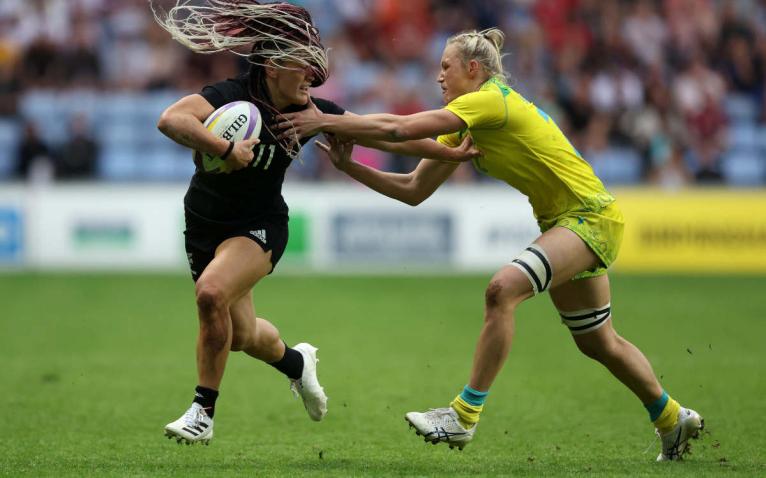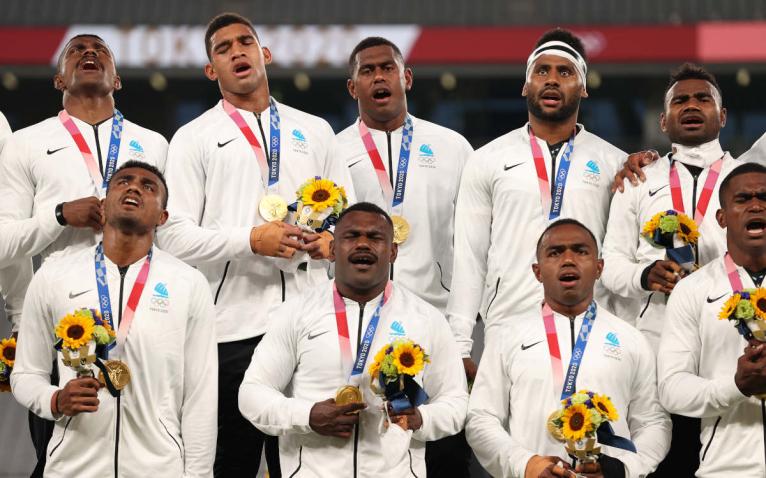Before last weekend’s Madrid Sevens, Black Fern Portia Woodman-Wickliffe came to talk to the commentary team about her journey through life and rugby. For thirty fascinating minutes, with humour and emotion, Woodman-Wickliffe described her start as as a semi-pro netballer with her heart set on becoming a Silver Fern. Portia was ambitious, and netball was the only option available at the time for female athletes in New Zealand who wanted play a fully professional sport.
But netball wasn’t to be her yellow brick road. Her exceptional talent was spotted by rugby scouts before the Rio Olympics, they whisked her off the court and onto the pitch, and the rest is history: Woodman-Wickliffe has won every major rugby trophy on offer in fifteen-a-side and Sevens. She holds the all-time try scoring record on the HSBC SVNS World Series and broke through the 250 try barrier in Singapore last month.
One particular anecdote of Portia’s stood out. Rio 2016, her Olympic debut, saw the Black Ferns lose to Australia in the final. The Black Ferns were crushed: a rugby silver to the rest of the world might be stellar, but to a New Zealander, born and bred into the code, it only means defeat. Fast forward four, then a Covid-enforced five years, to 2021, and the demons of Rio would be exorcised with an imperious display in the Tokyo final against France. This was it – the moment that they had fought for, worked for, suffered for, sacrificed for and dreamt of. They were Olympic champions, gold medallists. They had scaled their Everest.

Except.
This moment of triumph and elation was instead characterised, said Portia, by a feeling of hollowness. Because there they were, their medals round their neck in the magnificent 50,000 seat Tokyo Stadium – and it was empty. Silent. Not a single spectator had been allowed to attend. After celebrating as a squad as best they could (all party essentials were smuggled into the team hotel) the first ever NZ team to win an Olympic Rugby Sevens gold medal then returned home and went straight into quarantine. Immediately after that, rather than enjoy a public celebration, the team quietly joined the nationwide lockdown.
With 50 days to go to the Paris Olympics, a European Olympics hosted by a great rugby nation, we are all hoping that the moment is finally here
This feeling of deflation wasn’t only felt by Portia – air had escaped from all our Rugby Sevens balloons. Since Sevens became an Olympic sport – that so-called ‘game-changing’ moment when it was awarded Olympic status by the IOC – we’ve yearned for the fireworks and razzamatazz, for the fizz and skill of this wonderful game to be showcased by the Olympic Games. But circumstances have repeatedly worked against it. During Covid and its prolonged aftermath, even broadcasters struggled. I was commentating on Tokyo for US network NBC, who were hoping to get America hooked on the fast pace and thrill of the sport, and with some luck even beam live pictures of a USA medal win to millions Stateside. But no matter the talent on display and the sporting drama that unfolded on the field, the emptiness inside the stadium undermined the enthusiasm and drive the commentators tried so hard to bring. As Portia suggested – an empty stadium creates an emotional void. The momentum of Rugby Sevens felt as if it had stalled.
But with 50 days to go to the Paris Olympics, a European Olympics hosted by a great rugby nation, we are all hoping that the moment is finally here – the moment that Portia, and Rugby Sevens as a whole, has its chance to shine, to buzz, to catch fire and hit the big time. Paris might mark the shift that has been promised since 2016, and the horizon, so far, is looking good.

Rugby Sevens is the second-fastest selling ticket event at the Games, with all six days of action, men’s and women’s, sold out at the mighty Stade de France. Even with the stadium reconfigured for athletics, there will still be 60,000 fans in the stands enlivened by that inimitable, irrepressible Sevens atmosphere which sets it apart so distinctly from other sports. Twenty-four teams from all around the world will compete for medals in front of more fans that have ever attended a Sevens event. The noise, the atmos, the optics will be box office.
The French, we know, love their rugby, but, more than that, the host nation are good – very good. The France women’s team now regularly competes for medals on the HSBC SVNS Series and the men’s just won the inaugural Madrid Grand Final after a title-run in LA.
As Jonah Lomu did for fifteen-a-side in 1995, Antoine Dupont can do for Sevens in 2024.
And there is of course Antoine Dupont. The most famous rugby player in the world, quite probably the best – and definitely the most exciting. His star power is immense: in Madrid I met a French fan who had driven all the way from Carcassonne just to watch him play Sevens. He wasn’t alone. Dupont, with his fifteen-a-side achievements still reverberating around the streets of Toulouse, has only played three events on the Series – yet he has won a bronze and two golds already. He was selected for the Dream Team at all three events, snapped up the Rookie of the Season award, and the difference his presence makes to his France Sevens teammates is palpable. After the heartbreak at being knocked out of a home fifteen-a-side World Cup in Paris last year, the scrum half general now has a chance to inspire a gold medal at a home Olympics, in front of a sold-out crowd. As Jonah Lomu did for fifteen-a-side in 1995, Antoine Dupont can do for Sevens in 2024.

Fifty days out, it feels like we are building to the moment we all want for Rugby Sevens. Just as events conspired to dampen the spark of Tokyo, the stars are now aligning to set it alight in the City of Lights. The countdown has begun and the adrenalin is pumping – not just in the players’ training camps but through the arteries of the wider international rugby network. Players, administrators, sponsors, broadcasters and fans. We can all feel it. 2024 has every chance of being the year for Rugby Sevens. Allez!


Comments
Join free and tell us what you really think!
Sign up for free